Is buying gold a good investment? Why I don’t invest in gold
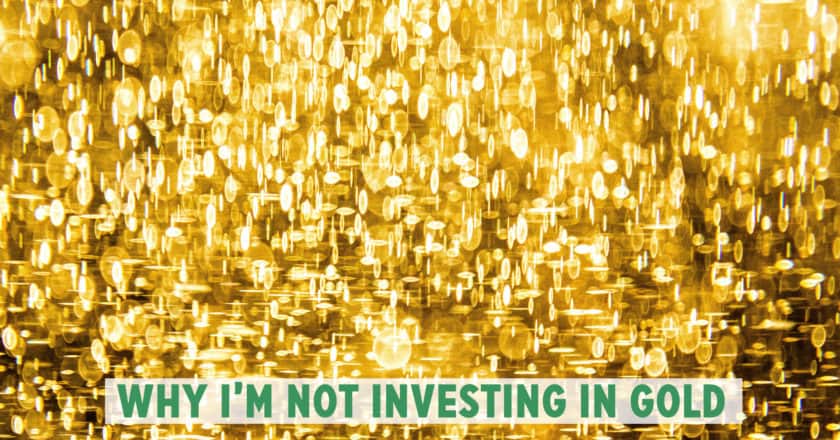
Over the past month, I've read a lot of articles about the virtues of investing in gold. Especially in Facebook forums, there's a lot of talk about how gold makes a great long-term investment. (Fortunately, I haven't seen any comments like this in the GRS community on Facebook.)
Whenever the economy gets turbulent, the goldbugs come out in force. They shout from the hilltops that the world is doomed and that the only safe haven is gold. And I'll admit, their arguments can sound pretty convincing.
When I started this site in 2006, I felt unqualified to comment on gold. I hadn't read much about it, and I didn't feel educated enough to offer an opinion. That's changed.
What happens if the stock market crashes? Here’s what to do

Can you feel it? There's panic in the streets! We're in the middle of a stock market crash and the hysteria is starting again. As I write this, the S&P 500 is down six percent today -- and 17.3% off its record high of 3386.15 on February 19th.
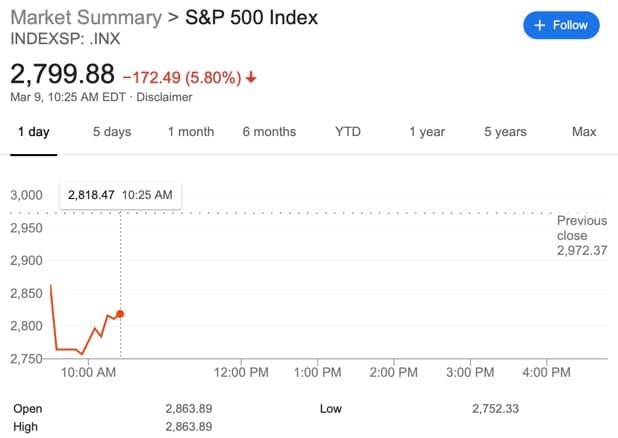
Media outlets everywhere are sharing panicked headlines.
The best passive income ideas for 2024

Earlier this week, J.D. wrote about what he calls the biggest truth in personal finance: You can't get rich through frugality alone. As Liz at Frugalwoods says, "You can't frugalize income you don't earn." Income is one-half the fundamental personal finance equation, and it's probably the most important half.
J.D. advocates a three-pronged attack for boosting income: becoming better educated, becoming a more valuable worker, and learning to negotiate salary. But I think he's missing a fourth important income source: the proverbial "passive income".
I know, I know. Passive income has a bad reputation. Actually, passive income has a terrible reputation. And deservedly so. The Land of Passive Income is populated by scammers, hucksters, and charlatans. "Hey, little boy, wanna buy my course?" (Sorry, no links. They're easy enough to find without us helping them.) That's too bad because legit sources of passive income can be a great way to make more money.
What are the best investing apps for 2024?
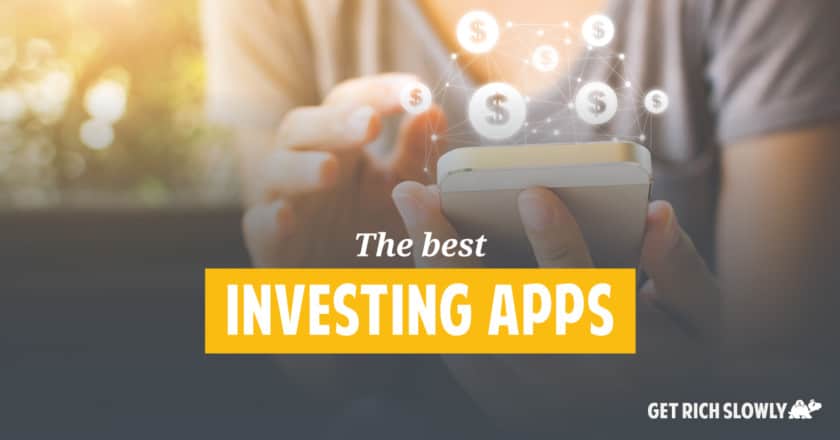
It has never been easier to invest.
In only a few years, the rapid advancement of mobile technology has placed the power to invest at our fingertips and ushered in a wave of fintech startups, armed with new and innovative solutions for investors. Names like Acorns and Stash are now competing head-to-head with traditional brands such as E-Trade, and TD Ameritrade. (Imagine E-Trade being considered a "traditional" brand!)
With so many great options to choose from, it can be downright difficult to decide which investment app is right for you. To take out the guesswork, I’ve compiled a list of the best investment apps for 2021. From beginner investors to advanced traders, there’s something here for everyone.
Which matters more for building wealth: Your saving rate or your investment returns?
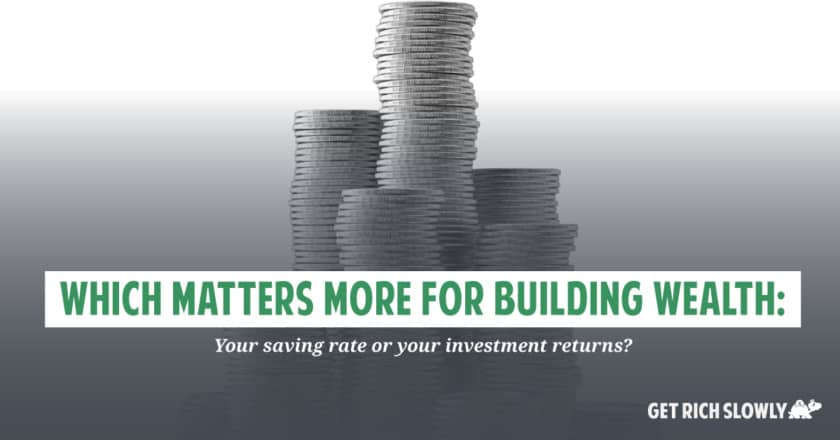
My name is Zach, and I write at Four Pillar Freedom, where I tend to tackle financial topics through data visualization. While J.D. is on vacation, I offered to explore one of his favorite topics: the effects of saving rate versus investment returns.
Albert Einstein supposedly once said that compound interest is the eighth wonder of the world.But does data actually support this claim?
In this post, I explore the nature of compound interest, how long it takes to become an important factor in wealth accumulation, and whether or not it actually matters much for people who hope to achieve financial independence in a relatively short time.
What we talk about when we talk about risk
Everybody’s financial situation -- age, income, saving rate -- is different.
But every retiree, early or late, aspiring or actual, has the same, simple investing imperative: We must preserve and grow our purchasing power in real terms in order to finance decades of future consumption.
This sounds simple (which it is) and obvious (which it isn’t).
Should you pay off your mortgage early?

My friend Amy recently wrote with an interesting dilemma. "Should I pay off my mortgage early?" she wonders.
Amy has a high-paying job and has managed to save enough that she could be completely debt-free if she wanted to. And she kind of wants to! But is this the best choice? She's aware that this is a nice problem to have — but it's still a bit of a muddle. She'd like some guidance.
Here's an abridged version of her email: Continue reading...
Bull vs. bear: A visual history of U.S. bull and bear markets since 1926
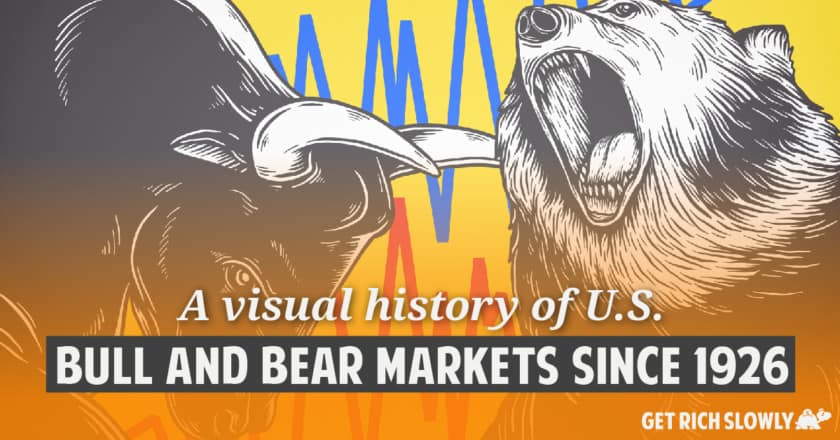
Who am I kidding?
I can't go an entire month without publishing anything here at Get Rich Slowly. I need to write. And judging from the feedback regarding my planned sabbatical, you folks want me to write! Tell you what, let's change the premise.
Instead of taking all of September off from publishing, I'll instead vow that for the next four weeks, I won't tackle any major articles. If there's something that I want to share and that thing can be shared in 20-30 minutes, I'll do it. This plan will serve the same objective -- freeing my mind to focus on the other tasks that need to get done around here -- while also giving me an outlet for my writing (and giving you something to read).
Is your home a better investment than the stock market?
I'll admit it: There are times that I think everything that needs to be said about personal finance has been said already, that all of the information is out there just waiting for people to find it. The problem is solved.
Perhaps this is technically true, but now and then -- as this morning -- I'm reminded that teaching people about money is a never-ending process. There aren't a lot of new topics to write about, that's true (this is something that even famous professional financial journalists grouse about in private), but there are tons of new people to reach, people who have never been exposed to these ideas. And, more importantly, there's a constant stream of new misinformation polluting the pool of smart advice. (Sometimes this misinformation is well-meaning; sometimes it's not.)
Here's an example. This morning, I read a piece at Slate by Felix Salmon called "The Millionaire's Mortgage". Salmon's argument is simple: "Paying off your house is saving for retirement."
How to get started with real estate investing

Today's article is from Chad Carson, who writes about real estate investing (and other money matters) at Coach Carson. I've always been intrigued by real estate investing but overwhelmed by how much info available. I asked Chad if he'd be willing to write an article that would help me (and other GRS readers) understand the basics of real estate investing. This is the result.
I got started in real estate investing right after college. Because a young adult can basically sleep in a car if he has to (my 1998 Toyota Camry with cloth seats was comfortable), I had little to lose by launching a business. Unfortunately, as a Biology major, I also knew very little about business or real estate. But I did know how to hustle and to learn. That helped.
Slowly, I learned to find good deals and to resell them for a small markup of profit (a.k.a. wholesaling). I also learned to buy, fix, and flip houses for a bigger profit (a.k.a. retailing). After a few years, my business partner and I began keeping some rental properties because we knew that was the path to generating regular, passive income.